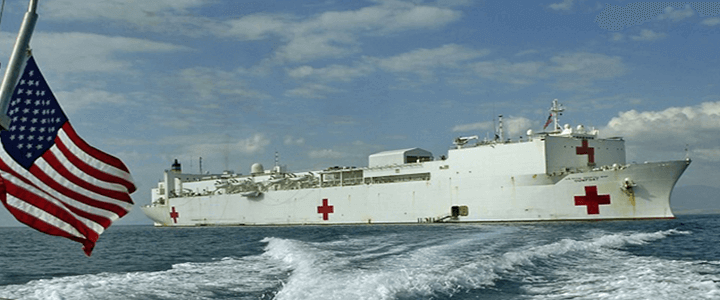I have often said that an American aircraft carrier appearing off the coast of a country is the biggest military message the nation can send. There is no greater symbol of American military might than a nuclear powered ship that rises 20 stories above the water, carrying 80 aircraft and 6,000 sailors. But there’s another ship that sends a different but no less impactful message: the USNS Comfort.
The U.S. Southern Command in Miami announced Wednesday that next month, the 1,000-bed hospital ship will deploy to Central and South America, including a visit to Colombia, “to provide needed medical assistance, according to the needs defined by each stop.” The Colombia stop is important, as the country has been overwhelmed with refugees fleeing the deprivation in neighboring Venezuela.
Crisis in Caracas
Venezuela’s political and economic crisis is spilling over into Colombia, and elsewhere. As of May, the Red Cross was estimating that more than one million Venezuelans had fled to Colombia since the country’s hyperinflation crisis began last year. More than 37,000 people are crossing from Venezuela into Colombia each day. Website ReliefWeb, which covers humanitarian missions around the world, reports that “Venezuela is now the most common nationality among those seeking asylum status in the United States.”
On top of the economic crisis, there is a political one. Venezuela’s President Nicolás Maduro is a socialist strongman who inherited his position from the late Hugo Chavez, a firebrand leader in the mold of Cuba’s Fidel Castro. Human Rights Watch, an international watchdog organization, says, among other things, that “no independent government institutions remain to act as a check on executive power,” Maduro has packed the courts “with judges who make no pretense of independence,” and that the government “has been repressing dissent through often-violent crackdowns on street protests, jailing opponents, and prosecuting civilians in military courts.”
Venezuela has the world’s largest reserves of crude oil, but prices have not stayed high enough to keep the country afloat. The situation is so bad that production cannot keep up with export commitments. That, combined with U.S. sanctions, has led to the lowest level of U.S. imports of Venezuelan crude since January of 2003. U.S. imports dropped below 20,000 barrels per day in August of 2017 and haven’t recovered.
The U.S. government is taking a tough stance against the Maduro government, but that does not mean it is blind to the suffering of the Venezuelan people.
Steadfast commitment of friendship
As I wrote last October, when she was deployed to Puerto Rico to help with hurricane relief efforts:
The Comfort, based out of Norfolk, Va., and her sister ship the USNS Mercy, based out of San Diego, began their lives as oil tankers. In the mid-1980s, they were converted to hospital ships. The Comfort is built to handle combat casualties, making her even more capable than many land-based hospitals. At 894 feet long (almost three football fields) and 106 feet wide, she hold 12 operating rooms, an 80-bed intensive care unit, four x-ray machines, a CT scanner, and four water purification units that can produce a total of 300,000 gallons of drinking water a day.
The Colombian government requested the ship to help ease the strain the migrant crisis has placed on its health care system. SOUTHCOM’s commander, Navy Adm. Kurt Tidd, said the deployment “will focus on the people we’re assisting, on the nations we’re partnering with, and on the region we’re supporting together.” The SOUTHCOM release said the mission, the Comfort’s sixth to the area since 2007, “reflects the United States’ steadfast commitment of friendship and solidarity with the Americas.”
As a retired Civil Affairs officer, I have long said that “soft power” is just as important in resolving conflict as the killing people and blowing things up. And as much of a nuisance as Venezuela has been, the U.S. isn’t invading (despite rumors that the president pushed for the option earlier this year). Sending the USNS Comfort to the region to… well… comfort those most affected by the Maduro regime’s policies is absolutely the right move.
Maduro, who escaped an assassination attempt (via weaponized drone) at a military parade last week, has fed his people a steady diet of anti-American propaganda for years. It’s not all Trump’s fault. Maduro has been in power since 2013, and has been lying to his people about U.S. intentions, and blaming the country’s woes on narrowly targeted U.S. sanctions, the entire time.
Sending a floating hospital capable of delivering care that surpasses anything most of its patients have ever experienced or will ever experience again is as powerful a message as anything else the U.S. could deliver. I did not shed a tear when Hugo Chavez died, nor will I when Maduro joins him on the ash heap of history. And one can only hope that sending medical assistance to South America lights the spark that causes the Venezuelan people to rise up and take back their country from the repressive, autocratic, authoritarian regime that has gripped it for decades.




